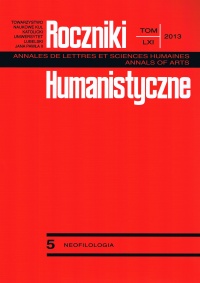Paradise Lost: Janusz Głowackis Antigone in New York und Dea Lohers Manhattan Medea
Abstract
In this article, describing the two contemporary dramas written by European writers (Glowacki, Loher), the author is paying a particular attention to the two women that were listed in the titles of these dramas-Antigone and Medea. Both were placed in the neo-contemporary re-reading of their antique prototypes (written by Sophocles and Euripides), now both of them are residents of New York City, illegal immigrants with a baggage of tragic life events, they are defeated in the world of new ideas and plans. Multiethnic New York City, a “promised land” for the thousands of immigrants, portrayed by the two dramatists, appears to be a lost paradise, a cursed place, metropolis that is ruled by the tough business laws. Both protagonists fail, they lose paramount principles: hope and love.
References
Catani, S.: Vom Anfang und Ende des Mythos. ‚Medea’ bei Christa Wolf und Dea Loher. In: Monatshefte, Vol.99, Nr.3, 2007, S. 316-332.
Haas, B.: Plädoyer für ein dramatisches Drama. Wien 2002.
Kott, J.: Antygona powiesiła się w Tompkins Square Park. [Antigone erhängte sich in Tompkins Square Park]. In: J. Głowacki: 5 ½ Dramaty. Warszawa 2007, S. 112-115.
Lehmann, H.-T.: Postdramatisches Theater. Frankfurt am Main 2008.
Stephan, I.: Medea. Multimediale Karriere einer mythologischen Figur. Bonn 2006.
Copyright (c) 2013 Roczniki Humanistyczne

This work is licensed under a Creative Commons Attribution-NonCommercial-NoDerivatives 4.0 International License.





